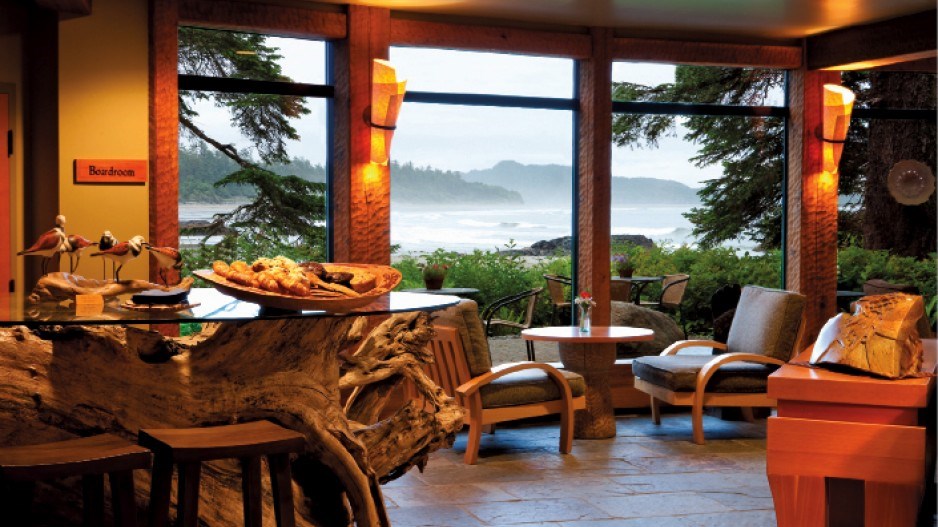Although the concepts of “luxury” and “sustainability” rarely go hand-in-hand, British Columbia is seeing a growing consumer demand for deluxe goods and services with sound environmental and social credentials.
Luxury hotels, like the Four Seasons Vancouver and the Wickaninnish Inn in Tofino, are emerging as leaders in this movement toward “sustainable luxury” through the implementation of cutting-edge technologies, policies and programs that are setting the international standard for sustainable business operations.
Both hotels have recently joined the ranks of only 51 prestigious hotels and resorts worldwide to achieve the highest Five Green Key rating by the Green Key Eco-Rating program, which ranks, certifies and inspects hotels and resorts based on their commitment to sustainable “green” operations.
“It started in 2007,” said Todd Jeannotte, director of catering and conference services at the Four Seasons Vancouver, about the hotel chain’s journey toward becoming a leader in sustainable hotel operations.
“I realized that we needed to quantify and formalize what we already had in place, not only in terms of our operations but also our corporate mindset. And we had to push it forward. ... Otherwise, we’d miss the boat on where we should be as a socially responsible company, and we’d miss the boat on what our customers want.”
Using the self-assessment tools provided by the Green Key Eco-Program as a benchmark for structuring their improvement efforts, the Four Seasons formed a green committee and began to assess operational areas such as utility consumption, employee training and supply chain management.
Investing in a hybrid heating system, the hotel was able to dramatically reduce its carbon footprint by programming and monitoring energy consumption based on the its daily capacity and activities.
“There are so many new products and technologies out there to help”, said Claire Macdonald, marketing manager for the Wickaninnish Inn, which recently installed high-efficiency fireplaces with electronic ignition modules that eliminate the need for a standing pilot light.
But making such improvements required an upfront investment and a solid, long-term commitment to improvement.
“There’s that leap of faith that’s going to happen for any business that decides they want to make some progress toward being more green because it’s going to cost money at some point,” said Jeannotte. “It really comes down to having a commitment to do the right thing.”
At times, that commitment requires an investment of time rather than money. “It actually took us two years to find the perfect napkin,” Macdonald explained. “We wanted a product that was environmentally friendly but still of high quality in texture and appearance.”
The resort eventually decided on 100% compostable napkins made from bamboo, a highly renewable and sustainable natural resource.
With the same commitment to sustainability and improvement, the Wickaninnish Inn understands the upfront costs involved. Having recently completing over $2.5 million in upgrades to the hotel, the Wick features a second high-efficiency boiler, the first of which was installed in 2008. Recent upgrades also include more energy-efficient lighting and fireplaces.
Demonstrating that luxury and sustainability no longer need to be mutually exclusive, hotels across B.C. are beginning to incorporate natural materials into the guest experience, like the Inn at Laurel Point in Victoria, which now provides earth-friendly guest amenities created with tree bough oils sustainably harvested from B.C.
“It’s really about celebrating your environment,” said Macdonald. “We’re always looking at our own environment for inspiration and try to source things from the area, from materials to workers, to local artisans. That’s all a part of sustainability.”
Although becoming more sustainable is not always easy, it is an experience that carries many rewards.
“There are many things [the Four Seasons did] over the past few years that have not only been good for the environment, but have actually saved us money over the long term,” said Jeannotte.
In an effort to reduce linen usage, which carries a significant annual cost and wastes energy and water to maintain, the Four Seasons purchased new residential tables, eventually completely eliminating linens from its buffets. “Three years later, we had completely paid the tables off,” said Jeannotte.
Secondary effects of the Four Seasons’ improvement efforts were also carried down to suppliers.
“As we started to look at our purchasing practices, we found that we could motivate our suppliers to rethink their own practices,” Jeannotte said. “It was as easy as asking for alternatives to Styrofoam containers or requesting 100% post-consumer napkins.”
This trickle effect of sustainability provides an example of how small but consistent efforts can lead to significant outcomes.
“It’s not about being 100% green,” Jeannotte explained. “It’s about being greener. Every little bit we do makes it better, from our purchasing practices to the menus we offer.”
Macdonald also discussed the importance of having a top-down support structure in place.
“Our commitment to sustainability comes down from management and is part of the soul of the hotel. And it’s a journey that never ends. We’re always looking for ways to get to the next level.”
“But you can’t do it all at once,” Jeannotte cautions. “Just start chipping away slowly and eventually things will start to happen.” •




